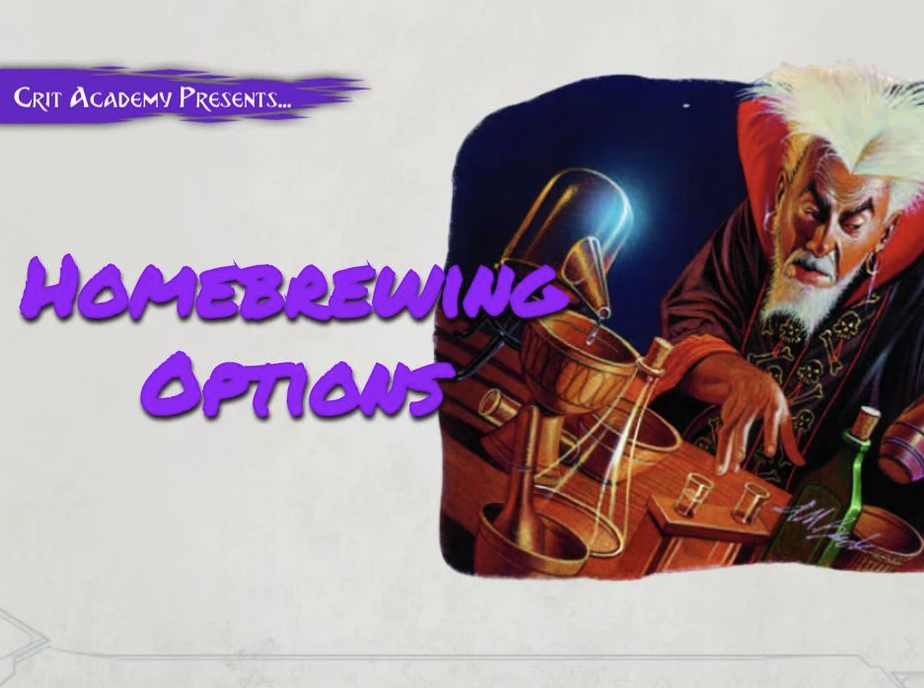D&D Homebrewing
Do you ever feel that sometimes a rule in your RPG needs changing? Or, maybe you want add a bit more detail than the game gives? Well, you're not alone. Many Dungeon Masters feel the same way. We've found this is especially true for people coming to Dungeons and Dragons 5th Edition from games like D&D 3.5 Edition or Pathfinder. Compared to the details and massive collections of books released for those products over the years, D&D 5e can feel a bit bare. Luckily, Wizards of the Coast has given you everything you need to include optional rules to enhance your game.
In this episode we discuss homebrew rules and optional rulings to help enhance your game. While we believe the game is great as designed. There are many changes Dungeon Masters have made to their games to address certain aspects of the game to suit their tables needs. We discuss a few of those options here. Although we have used many of these homebrew rules we have not used all of them.
Please let us know what homebrew rules you use to enhance your game and why. In the comments below.
Recommendations:
Visit the Dungeon Masters Guild for all the homebrew you can imagine!
Homebrewery: A free web based tool to help you create content with a professional look
Unearthed Tips and Tricks: New and reusable D&D content for you to bring with you on your next adventure.
Character Concept:
Bourbontoe
Merric Bourbontoe was a halfling monk who became a world-renowned ale brewer. His ale
was said to be so good that people would break into his brewery and steal it. In order to defend himself, Merric taught himself to fight, and once he could fight he became an adventurer to help support his brewery.
At every tavern Merric encountered he would ply his wares. He’d talk himself up, and educate everyone about the virtues of his delicious Bourbontoe bourbon. He’d even supply free drinks whenever he was victorious on a quest.
Eventually other adventurers (other players in other campaigns) would ask for Bourbontoe
by name, and tavern keepers would attract customers by advertising that they had the best
Bourbontoe in the land.
Merric Bourbontoe was a specific character, but you can follow in his footsteps - so to speak
by making your own character with a clearly defined niche in the world (such as creator of a
unique product, practitioner of a unique trade, and so on) that makes an effort to bring their
craft or product out into the world. Before you know it, other players in other campaigns will
be asking for your product wherever they go!
Encounter Concept:
The Courtroom
Not all encounters have to be combat encounters. In this case, the encounter comes
as a direct result of something that’s happened previously. Perhaps a player has attempted
some unsound tactics in combat, and, as a result, some civilians or innocents were killed
or injured. Maybe they failed a save against an enemy’s mind control, and while under thrall
they assassinated a prince and caused two countries to go to war. Maybe they didn’t do
anything wrong at all, but a witness thinks that they did. Whatever the case, they have been
brought to court to be tried for their crimes.
While in court, witnesses are brought to testify for or against the player. Depending on your
players’ roleplaying skills, you might assign NPCs to your players, and give them notes in
secret detailing a particular NPC’s goals and motives. One player might take on the role of
a bereaved parent who witnessed their child cut down by the PC’s actions, while another
player might be an NPC who was bribed by a villain to give false testimony against the party.
This can give great opportunities for players to flex their roleplaying muscles and put on an
emotional and powerful performance. It also lets players feel the repercussions of the types
of actions that generally get brushed off by most players and DMs in favor of keeping the
story moving. If you want your world to feel like a living, breathing place with all actions
having consequences, then send a player to the courtroom.
Magic Item:
Darkvision Goggles
Wondrous, Uncommon
Do you enjoy playing humans, but constantly find yourself in a party full of elves or orcs who
feel at home in the darkness just as in the day? Are you constantly bumping into low hanging stalactites on your trips through the underdark? Are you sick of knocking over furniture when searching for your chamberpot at night?
Get yourself a pair of Darkvision Goggles! Simply put, they are a pair of magical goggles
that grant the wearer Darkvision out to 60 feet as well as seeing through magical darkness up
to 15 feet. Never embarrass yourself in front of a Drow patrol again!
DM Tip:
Err on the Side of the Players
You’re running an encounter, and the players are losing. You’re trying a new monster, and it
turned out to be way more powerful than you thought it would. You don’t want the campaign to end in a TPK, especially if it’s because you misjudged the monsters’ stat block, so what to do?
The answer: err on the side of the players. If you made a mistake, do whatever is best for the
players. If you made the encounter too difficult, then maybe just knock off some of the monsters’ hit points so that they’ll go down sooner. Maybe have a bigger monster show up and chase the smaller monsters off, leaving the players for dead. As long as you don’t make a habit of pulling out a deus ex machina on your players, I doubt anyone is going to mind getting saved by the DM once or twice (and that’s if they even realize it’s happening). Use the mistake as a learning experience.
Player Tip: Don't be A Dick!
Character Building Away from the Table
Have you ever packed up your books after the session was over, and then gone home and
wished you didn’t have to wait until the next session to play some more? Have you ever had
a fun moment between two characters that didn’t quite get fleshed out enough at the table?
Have you ever just had the urge to roleplay your character, but you’re at home by yourself?
Build your character away from the table! Start an email chain between yourself and the
other players, in character. Write out a journal from your character’s perspective. If the last
session ended with the characters taking a few days to rest in town, make a list of things your
character is doing (or wants to do) during the downtime. Doing these sorts of exercises not
only works your roleplaying muscle, but it also might help you develop new motivations and
new ideas for fun things to do at the table. Next time your group gets together you’ll have all sorts of new fun things to tell the other players that will make it more fun for everybody!
We hope you enjoyed your experience here on Crit Academy, if you did, please consider sharing our show and leaving a review here on itunes.
Support Us:
Subscribe to our Blog and be entered to win phat lootz every week.
Visit our website at www.critacademy.com or become a patron donor and get additional phat loot!

